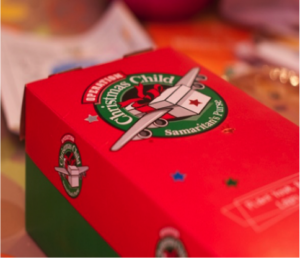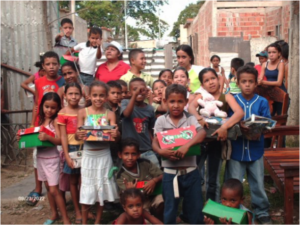 A cardboard box is as ordinary as it gets, about as ordinary as a manger, some water, and dirt. There is ordinary all around us. Casual conversations, jobs, and even relationships can seem as plain as white bread and a piece of unwrapped American cheese. That’s why the child in each of us gets so excited with the first snowfall or the Christmas lights across the street. We want to see something new, something beyond the ordinary. Our hearts long for miracles, but the One who creates them has a sense of humor. His favorite material to use when He works His magic is exactly what we are trying to look past, the ordinary. He rarely uses the “wow” to weave in His wonder. He prefers mangers, water, and mud. We celebrate at Christmas because God’s greatest miracle was born in a pile of hay and a cloud of animal stench. Nothing spectacular in that setting. A few years later and Jesus made wine fit for kings out of water set aside to wash feet, and when He saw a man who was born blind, He spit in some dirt, made some mud and rubbed it in his eyes. Pretty gross, but when the man washed off the mud, he could see. Colors, trees, the sky were all unveiled to him through spit and dirt.
A cardboard box is as ordinary as it gets, about as ordinary as a manger, some water, and dirt. There is ordinary all around us. Casual conversations, jobs, and even relationships can seem as plain as white bread and a piece of unwrapped American cheese. That’s why the child in each of us gets so excited with the first snowfall or the Christmas lights across the street. We want to see something new, something beyond the ordinary. Our hearts long for miracles, but the One who creates them has a sense of humor. His favorite material to use when He works His magic is exactly what we are trying to look past, the ordinary. He rarely uses the “wow” to weave in His wonder. He prefers mangers, water, and mud. We celebrate at Christmas because God’s greatest miracle was born in a pile of hay and a cloud of animal stench. Nothing spectacular in that setting. A few years later and Jesus made wine fit for kings out of water set aside to wash feet, and when He saw a man who was born blind, He spit in some dirt, made some mud and rubbed it in his eyes. Pretty gross, but when the man washed off the mud, he could see. Colors, trees, the sky were all unveiled to him through spit and dirt.
Cardboard boxes, shoeboxes to be specific, also work well to unveil miracles. My friend, Lilian, was carrying some of those boxes in the trunk of an old Venezuelan taxi. She smiled as she looked back through the rear window. Through the dust, she could see another taxi carrying her friends, and like her, carrying more boxes for an organization called Operation Christmas Child. The children were already there. She could see them waiting in the shade of the cement church, and they cheered as she pulled up. Running in their flip flops and faded, ripped jeans, they circled around her as she stepped out of the taxi and into the heat. Their smiles filled her, and she silently thanked God, leading them into the cool of a simple room. All of the children were directed to sit on the tile floor as the boxes were stacked. Shafts of dusty light broke through holes in the tin roof, and the cheerful voices echoed off the walls. To Lilian, the noise was beautiful, the sound of hope.
 When the children were quiet, the pastor asked them, “Are you enjoying the party?” and they shouted and giggled in response. “These boxes,” he said, “are an expression of God’s love for you. People prayed for you as they packed them.” He spoke to them about the real reason for Christmas, he prayed, and when he was done, the boxes were passed out with instructions to not open them yet. Some of the children shook with nervous energy, and others shook the boxes to guess what was inside. Then Lilian stepped to the front of the room and told them it was time for a countdown: “10, 9, 8 . . .” All of the little voices joined in. “7, 6, 5 . . .” Little fingers found their way to strips of tape. “4, 3, 2, 1,” and the last number was lost in the sounds of screams and ripping paper. In the melee of ripped cardboard and empty boxes, children danced, holding new cars and dolls, and Lilian stooped down to give them hugs. Christmas had come to the little cement church. The volunteers laughed with delight until a little girl caught their attention. Their hearts sank as they watched her pull out a hat, scarf and gloves. The Venezuelan heat already had the children lingering in the cool of the church. Streams of sweat ran down their faces in the melee of packages and toys. What would a little girl do with winter clothes? Who would pack a hat, scarf and gloves in a box heading to Venezuela? The questions came quickly, but there were no answers, until Lilian looked at her face. She was smiling. Standing up, she flung the scarf proudly around her neck, and yelled out, “How did they know?”
When the children were quiet, the pastor asked them, “Are you enjoying the party?” and they shouted and giggled in response. “These boxes,” he said, “are an expression of God’s love for you. People prayed for you as they packed them.” He spoke to them about the real reason for Christmas, he prayed, and when he was done, the boxes were passed out with instructions to not open them yet. Some of the children shook with nervous energy, and others shook the boxes to guess what was inside. Then Lilian stepped to the front of the room and told them it was time for a countdown: “10, 9, 8 . . .” All of the little voices joined in. “7, 6, 5 . . .” Little fingers found their way to strips of tape. “4, 3, 2, 1,” and the last number was lost in the sounds of screams and ripping paper. In the melee of ripped cardboard and empty boxes, children danced, holding new cars and dolls, and Lilian stooped down to give them hugs. Christmas had come to the little cement church. The volunteers laughed with delight until a little girl caught their attention. Their hearts sank as they watched her pull out a hat, scarf and gloves. The Venezuelan heat already had the children lingering in the cool of the church. Streams of sweat ran down their faces in the melee of packages and toys. What would a little girl do with winter clothes? Who would pack a hat, scarf and gloves in a box heading to Venezuela? The questions came quickly, but there were no answers, until Lilian looked at her face. She was smiling. Standing up, she flung the scarf proudly around her neck, and yelled out, “How did they know?”
“How did they know what, honey?” Lilian asked, walking over to her.
Pulling the hat over her head, she said, “How did they know my family is moving to Merida?” She was moving to the mountains, the coldest place in Venezuela, and the only place it snows. Lilian had no words. She threw her arms around the beaming girl, holding her tight, as if holding her would make the moment last. When she finally let go, she stooped down, looking her in the eyes, and said, loud enough for all to hear, “God knew, and He loves you!”
In a very mundane cement church, some children opened some boxes, and God unveiled his magic. He showed a little girl that He sees her. God likes to package His miracles in the ordinariness of life and surprise us with His love. Although life may beat us down enough to make us believe we are a little below ordinary, and packing a simple cardboard box can feel like a mundane task, all that we see as ordinary could be a first step into wonder. Like children tearing open boxes, we can look beyond the cardboard and find joy in the treasure God has waiting for us. It may be a conversation, a song on the radio, or a meal at the table, but God wants us to experience Him in the everyday, even in ordinary things like a cardboard box.
Written by Erin Ahnfeldt
Pulpit Rock is participating in Operation Christmas Child. This Sunday is the last week of Operation Christmas Child collection. Drop your shoebox in The Gathering Place.


